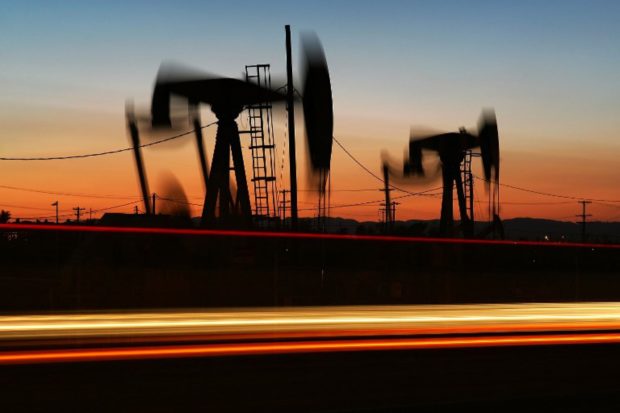Oil producers see oversupply, eye cutting output

Oil rigs at work at dusk. Major oil producers said Sunday, Nov. 12, 2018, that crude supply next year would outstrip demand, calling for new strategies that might include cutting production. AFP FILE
ABU DHABI, United Arab Emirates – Major oil producers said Sunday that crude supply next year would outstrip demand, calling for new strategies based on production adjustments.
Khalid al-Falih, Energy Minister of the world’s top supplier Saudi Arabia, said the kingdom would cut its production by 500,000 barrels per day.
Russia, the world’s second-biggest producer, said it would commit to any new agreement among producers to cut output.
Meeting in Abu Dhabi to examine how to curb a sharp slide in oil prices, the producers said they “reviewed current oil supply and demand fundamentals and noted that 2019 prospects point to higher supply growth than global requirements.”
They would therefore consider “options on new 2019 production adjustments, which may require new strategies to balance the market,” they said in a statement at the end of the meeting.
Suheil al-Mazrouei, energy minister of the host country UAE, hinted that producers are preparing to cut output.
“A new strategy needs to be formed… whether it is a cut in production or something else, but it will not be an increase in production,” he said.
A decision is expected only when the OPEC and non-OPEC ministers meet in Vienna on December 5 to assess the global energy market.
Falih said they would then decide whether to adjust production and by how much.
Oil prices have shed a fifth of their value in just one month after surging to a four-year high in early October, driven by a combination of factors centred on higher supply and fears of sluggish demand.
Energy ministers from Russia, Oman, Kuwait and Algeria were among those who attended the one-day meeting.
Saudi Arabia has been pumping 10.7 million bpd since October, Falih said.
Ahead of the meeting, he acknowledged that so far there was no new deal to cut production among OPEC and non-OPEC producers, who struck an agreement in late 2016 to cut output by 1.8 million bpd to tackle an oversupply crisis.
“There is no consensus yet among oil producers about cutting production,” Falih said.
When asked about the possibility of an output cut, he insisted it was “premature to talk about a specific action”.
“We have to study all the factors,” he said.
Price drop ‘surprised us’
Brent crude dropped below $70 a barrel on Friday for the first time since April, while the New York’s West Texas Intermediate (WTI) sank below $60 a barrel, a nine-month low.
In his speech at the start of the meeting, Falih said the recent sharp drop in prices had “surprised us”.
He said market sentiment had shifted from fears of shortages to worries about oversupply.
He also attributed the sharp drop in prices to “microeconomic uncertainties” and signs of a build-up in crude inventories.
The UAE’s Mazrouei said the goal of OPEC and non-OPEC cooperation was to strike a balance in the market.
The latest price slump comes after the United States boosted production of shale oil, while Saudi Arabia, Russia and others raised supplies of crude amid signs of slowing demand.
There have also been signs that renewed US sanctions on Iranian oil exports may have a softer-than-expected impact.
“Prices have been falling amid a continued rise in crude supplies from big producers, such as Saudi Arabia, Russia and the US, more than compensating for lost Iranian barrels,” Forex.com analyst Fawad Razaqzada told AFP.
“With the Iranian sanctions not being as severe as initially feared, officials from the OPEC and non-OPEC producers may discuss at the weekend the need to bring compliance back down… or risk another 2014-style slide in prices.”
Producers implemented large cuts starting at the beginning of 2017 and managed to push up oil prices from below $30 a barrel to over $85 in October, strongly improving their revenues.
But producers eased output cuts in June after signs of a tighter market and higher prices, selling hundreds of thousands of extra barrels.
Commerzbank, Germany’s second-largest lender, said Friday that oil producers must act to prevent prices tumbling.
“If they fail to signal any intention to reverse the latest increase in production, oil prices threaten to slide further,” the bank said in a note. /cbb














